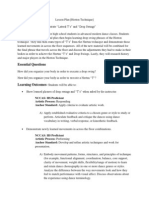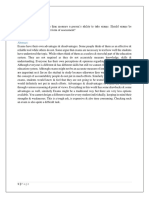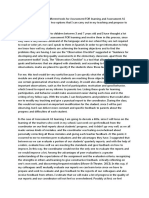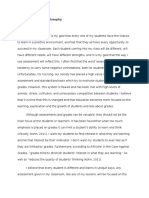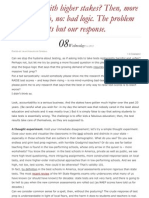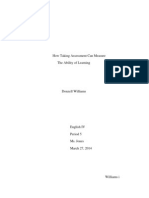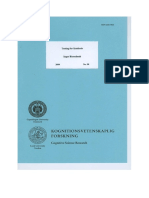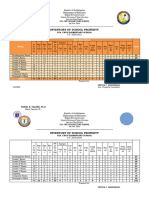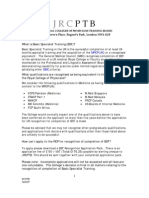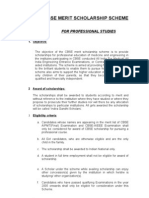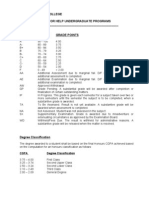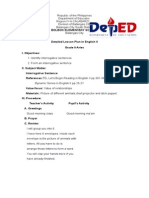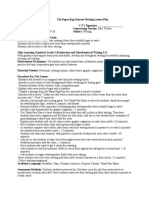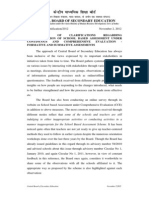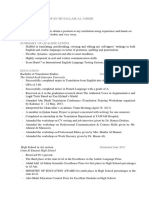Assessment
Assessment
Uploaded by
api-253396474Copyright:
Available Formats
Assessment
Assessment
Uploaded by
api-253396474Original Title
Copyright
Available Formats
Share this document
Did you find this document useful?
Is this content inappropriate?
Copyright:
Available Formats
Assessment
Assessment
Uploaded by
api-253396474Copyright:
Available Formats
Assessment Assignment
List and explain all current evaluation and grading practices you
think are beneficial to students and their learning.
> Authentic testing is beneficial for students in dance classrooms because
dance is mostly physical and educators would need to see students actually
embodying the things they have been trained to do.
> Indirect assessment is very profitable in a dance class. The nature
of
dance is that youre constantly improving in technique, flexibility, etc. so
being able to physically see students improve is a form of indirect
assessment.
> Open response and essay items, I think, are helpful in a dance classroom
because students are able to access higher order thinking skills when they
have to analyze what they are doing past the dance movements and explain
the history of the movement and what it means to them as a dancer of the
movement, for example.
> Summative evaluation is another tool that is essential to a dance teacher. I
say this being that in high school some students may only be in the class for
a P.E. credit and it is only in their interests to come and participate and not
necessarily indulge in it. To grade them on their love for dance would be
subjective which is not a legitimate reason to give students bad grades;
therefore summative evaluations would be best, they look at the work done
and grade them accordingly.
> Lastly, objective test items (true/false, matching, multiple choice) are
needed in a dance classroom. These paper tests are needed because there are
terms, concepts, and histories that ought to be addressed in order to be in
alignment with state standards, as well as, understanding of what and why
students are doing movements.
List and explain all grading and assessment practices you think
are, although not harmful, nonetheless not beneficial to students
and their learning.
> Multiple choice tests arent that beneficial, in my opinion, because they
only require lower level thinking and at some point students need a
challenge and higher order thinking exercises to fully understand disciplines.
> SAT and ACT type tests arent hurtful for students but I do feel that they
are too high-stakes for college entry.
> Assignments like bellringers and or daily quizzes are not harmful, but
could become redundant enough for the students to not really want to put
much effort into giving the bests efforts.
List and explain all grading and assessment practices you think
are harmful or destructive to students and their learning.
> I think norm-referenced tests are some of the worse things you can do to a
student because there is no such thing as a norm when youre talking
about children and educators here in America. There are so many things that
could be considered a norm, but are not included when comparing students
to one another.
> High-stakes standardized tests used to be something I didnt mind because
it gave students and teachers something to gage knowledge and an efficient
way to move students to the next level. Today, that is not the same story.
Standardized tests have become corrupted by politics and money and now
its about teachers keeping their jobs and students memorizing facts in order
to progress to the next grade level.
> Busy work tests and assignments are also potentially harmful for students
because the repetition of answering questions only shows that they can
memorize information, but does not show that they are able to apply the
information to real-life situations.
Reflect on the three lists that you have made. What do they tell
you about your own personal dispositions toward evaluation
and grading?
After looking at the lists that I had to write above, I feel that I believe
strongly in authentic assessment and grading. I don't think students
should be pressured learn with the only incentive being a good grade
or college acceptance letters.
You might also like
- TESL Homework 2 Module - 5Document2 pagesTESL Homework 2 Module - 5Alvaro Garriga100% (4)
- Master Lesson PlanDocument8 pagesMaster Lesson Planapi-253396474No ratings yet
- Importance of ExamDocument6 pagesImportance of ExamNoorazian Noordin100% (1)
- My Personal Teaching PhilosophyDocument6 pagesMy Personal Teaching PhilosophytonisohuNo ratings yet
- Assessment Is a-WPS OfficeDocument3 pagesAssessment Is a-WPS Officejsjjsjs ksksndNo ratings yet
- Interview ReviewDocument7 pagesInterview ReviewJairo EmarNo ratings yet
- Common Interview Questions For Primary TeachersDocument6 pagesCommon Interview Questions For Primary TeachersBhavesh KNo ratings yet
- Should Examination Be Banned?Document2 pagesShould Examination Be Banned?Braviour Wind Jack100% (2)
- Interview GuideDocument96 pagesInterview GuideCaressie BiscoNo ratings yet
- P 2 EslDocument6 pagesP 2 Eslapi-285570541No ratings yet
- Assessing For Learning: Objective and Essay Tests: BORICP12.doc - 1Document57 pagesAssessing For Learning: Objective and Essay Tests: BORICP12.doc - 1crizza_shineNo ratings yet
- Justification 4Document3 pagesJustification 4api-297284721No ratings yet
- Vatterott, Cathy. "Making Homework Central To Learning.", 2011, 60-64Document3 pagesVatterott, Cathy. "Making Homework Central To Learning.", 2011, 60-64api-265521535No ratings yet
- Why We Use Test?: T o Identify What Students Have LearnedDocument3 pagesWhy We Use Test?: T o Identify What Students Have LearnedPrecious Pearl100% (1)
- Unit 7 Feedback and ReportingDocument20 pagesUnit 7 Feedback and Reportingkevinthefuture50No ratings yet
- Universidad Tecnológica Gral. Mariano EscobedoDocument4 pagesUniversidad Tecnológica Gral. Mariano EscobedoIsidro VillarrealNo ratings yet
- How Well Do You Think Standardized Tests Measure Your Abilities?Document18 pagesHow Well Do You Think Standardized Tests Measure Your Abilities?POORANIKANNANNo ratings yet
- Summative RebuttalDocument4 pagesSummative RebuttalJefferson JohnsonNo ratings yet
- My Thoughts On High School TestingDocument2 pagesMy Thoughts On High School TestingmrslopesNo ratings yet
- There Are Three Types of AssessmentDocument6 pagesThere Are Three Types of Assessmentapi-316564284No ratings yet
- English 4Document8 pagesEnglish 4Ali SheraziNo ratings yet
- Edre 146 R3Document2 pagesEdre 146 R3Mackenzie PatricioNo ratings yet
- Educ 5440 DISCUSSION ASSIGNMENT UNIT6Document2 pagesEduc 5440 DISCUSSION ASSIGNMENT UNIT6Olaniyi Isaac100% (1)
- Hat Journal 11Document2 pagesHat Journal 11api-664805937No ratings yet
- Grading PhilosophyDocument4 pagesGrading Philosophyapi-477479374No ratings yet
- Philosophy of AssessmentDocument3 pagesPhilosophy of Assessmentapi-279813564No ratings yet
- Essay On The Importance of ExaminationsDocument2 pagesEssay On The Importance of ExaminationsAmeer Ahmed100% (1)
- Assessment Philosophy - FinalDocument5 pagesAssessment Philosophy - Finalapi-332187763No ratings yet
- Academic Writing Assessment in EducationDocument4 pagesAcademic Writing Assessment in EducationNURFADHILAH BINTI MOHD USUKI MoeNo ratings yet
- More Tests With Higher StakesDocument6 pagesMore Tests With Higher StakesrismaputrisartikaNo ratings yet
- Report For Psych Assessment ScriptDocument5 pagesReport For Psych Assessment ScriptAling inengNo ratings yet
- Peer Assessment 3Document3 pagesPeer Assessment 3Azalia Delgado VeraNo ratings yet
- Professional Inquiry Project: How Does The Assessment of Competencies Impact Students and Teachers?Document13 pagesProfessional Inquiry Project: How Does The Assessment of Competencies Impact Students and Teachers?api-276042567No ratings yet
- Are Examinations A Fair Way of Testing Our KnowledgeDocument2 pagesAre Examinations A Fair Way of Testing Our KnowledgeKendra ComtyNo ratings yet
- Summer 2023 Task 7 Portfolio Refleciton and Assessment Philosophy Statement Edf4430Document3 pagesSummer 2023 Task 7 Portfolio Refleciton and Assessment Philosophy Statement Edf4430api-664411729No ratings yet
- Examinations Should Be AbolishedDocument12 pagesExaminations Should Be Abolishedscribble_55No ratings yet
- Grading System Is Better Than Marks DebateDocument12 pagesGrading System Is Better Than Marks DebateMayank GargNo ratings yet
- Ed 617 Final ExamDocument4 pagesEd 617 Final ExamErin CisnerosNo ratings yet
- Assessment PhilosophyDocument3 pagesAssessment Philosophyapi-280373666No ratings yet
- Activity 5 - Araling PanlipunanDocument16 pagesActivity 5 - Araling PanlipunanChristine Joy Marcel100% (1)
- BvnessayDocument1 pageBvnessayyenlhp.ndvnNo ratings yet
- Tech Guest Speaker Reflection 1Document2 pagesTech Guest Speaker Reflection 1api-532615236No ratings yet
- 5.testing and Evaluation An Effective Process of Learning LanguageDocument8 pages5.testing and Evaluation An Effective Process of Learning LanguageluciferNo ratings yet
- Final ResearchDocument9 pagesFinal Researchapi-251356389No ratings yet
- Fs 5 Episode 1Document5 pagesFs 5 Episode 1api-309997842No ratings yet
- Pride Checklist: Not Yet Meets Exceeds PersistenceDocument2 pagesPride Checklist: Not Yet Meets Exceeds Persistenceapi-295237648No ratings yet
- Reflection About The New Dimensions in AssessmentDocument2 pagesReflection About The New Dimensions in AssessmentkwinixxNo ratings yet
- Continuous Assessment Is A Fairer Way To Judge A StudentDocument1 pageContinuous Assessment Is A Fairer Way To Judge A StudentAyubNo ratings yet
- VPC VP VP: PPPP PPP PP PPPPPPPPDocument6 pagesVPC VP VP: PPPP PPP PP PPPPPPPPyibie19852467No ratings yet
- AnswerDocument2 pagesAnswerMary Grace Calamay Acruz100% (5)
- AssignmentDocument4 pagesAssignmentMahnoor ParachaNo ratings yet
- TKT - Testing and AssessmentDocument14 pagesTKT - Testing and AssessmentSam ClarkNo ratings yet
- Journal For Philoposhy of AssessmentDocument6 pagesJournal For Philoposhy of Assessmentapi-395977210No ratings yet
- School TestingDocument7 pagesSchool TestingEva Noviana BudiyantiNo ratings yet
- Standard Seven - Artifact OneDocument4 pagesStandard Seven - Artifact OnestassiastassNo ratings yet
- Evaluation Assessment PhilosophyDocument3 pagesEvaluation Assessment Philosophyapi-239774394No ratings yet
- Artifact 1-8Document3 pagesArtifact 1-8api-282337447No ratings yet
- Assessment: Figure 1: A Range of Assessment ProceduresDocument5 pagesAssessment: Figure 1: A Range of Assessment ProceduresanjanareadNo ratings yet
- Classroom Assessment - EFL (6-1)Document17 pagesClassroom Assessment - EFL (6-1)Denn JuniorNo ratings yet
- Self and Peer EvaluationDocument35 pagesSelf and Peer EvaluationevolteddyNo ratings yet
- Master the Essentials of Assessment and Evaluation: Pedagogy of English, #4From EverandMaster the Essentials of Assessment and Evaluation: Pedagogy of English, #4No ratings yet
- Fo 1Document3 pagesFo 1api-253396474No ratings yet
- Ice BreakerDocument2 pagesIce Breakerapi-253396474No ratings yet
- Teaching AssesmentDocument1 pageTeaching Assesmentapi-253396474No ratings yet
- LP 8Document5 pagesLP 8api-253396474No ratings yet
- LP 2Document6 pagesLP 2api-253396474No ratings yet
- LP 6Document5 pagesLP 6api-253396474No ratings yet
- Block PlanDocument1 pageBlock Planapi-253396474No ratings yet
- Holman 2014 CVDocument4 pagesHolman 2014 CVapi-253396474No ratings yet
- CV Jiahang Li-10302014Document5 pagesCV Jiahang Li-10302014api-269542860No ratings yet
- BBB SCAM Report FSO-4Document1 pageBBB SCAM Report FSO-4Queen SearlesNo ratings yet
- Testing For SynthesisDocument23 pagesTesting For SynthesisBob OntarioNo ratings yet
- Research Paper Final ColorDocument12 pagesResearch Paper Final Colorapi-359161098No ratings yet
- Inventory of School's Furnitures 2021Document5 pagesInventory of School's Furnitures 2021ClarisaaNo ratings yet
- Theses TitlesDocument33 pagesTheses TitlesJallene Kay Cagatin Padigos0% (1)
- Getting Off To A Good Start: Teacher FactorDocument30 pagesGetting Off To A Good Start: Teacher Factorsara wilsonNo ratings yet
- Halloween WorksheetsDocument65 pagesHalloween WorksheetsAnahi Garcia Roa100% (4)
- Position Paper About Online ClassesDocument4 pagesPosition Paper About Online ClassesJessica Aranton100% (2)
- BST GuidelinesDocument6 pagesBST GuidelinesAman Raj KNo ratings yet
- Lesson Plan Week 4 (LM)Document12 pagesLesson Plan Week 4 (LM)Irdawati ShuibNo ratings yet
- Www.getpedia.comDocument45 pagesWww.getpedia.comASIF RAFIQUE BHATTINo ratings yet
- Cbse Merit Scholarship Scheme: For Professional StudiesDocument16 pagesCbse Merit Scholarship Scheme: For Professional StudiesSai CharanNo ratings yet
- HUC Program Grading SchemeDocument1 pageHUC Program Grading SchemeThanis RaoNo ratings yet
- Lse Business International Relations The PDocument11 pagesLse Business International Relations The PmanojkumarmurlidharaNo ratings yet
- Grade 2 DemoDocument8 pagesGrade 2 DemoSharmaeAyaMasangcay0% (1)
- Lesson Guide in Earth and Life Science I. Objectives: Geologic Processes That Occur Within The EarthDocument3 pagesLesson Guide in Earth and Life Science I. Objectives: Geologic Processes That Occur Within The EarthJT SaguinNo ratings yet
- William James PDFDocument3 pagesWilliam James PDFSamraNo ratings yet
- Official and Unofficial Visits: Scott Connors and Eric MayesDocument39 pagesOfficial and Unofficial Visits: Scott Connors and Eric Mayesbenjamin madridNo ratings yet
- Lesson Plan - Paper Bag Princess PDFDocument2 pagesLesson Plan - Paper Bag Princess PDFapi-456843789No ratings yet
- 2020-2021 Sound of Pride Leadership ApplicationDocument2 pages2020-2021 Sound of Pride Leadership ApplicationZachNo ratings yet
- In Gov cbse-TETCR-2717308320301082021DECDocument1 pageIn Gov cbse-TETCR-2717308320301082021DECAmit KumarNo ratings yet
- Action Plan in ClinicDocument2 pagesAction Plan in ClinicGrace Mary Tedlos BoocNo ratings yet
- Rabiul Islam F CVDocument2 pagesRabiul Islam F CVarafatnelson0No ratings yet
- Study in Lyon, FranceDocument45 pagesStudy in Lyon, FranceanifaureNo ratings yet
- Registry of Qualified Applicants (Rqa) From Recalibration For Elementary and Junior High School Teaching Position For Sy 2020-2021Document17 pagesRegistry of Qualified Applicants (Rqa) From Recalibration For Elementary and Junior High School Teaching Position For Sy 2020-2021Iris Rivera-Perez0% (1)
- GenSan TOT Sessions 1 Overview and General GuidelinesDocument94 pagesGenSan TOT Sessions 1 Overview and General GuidelinesJuLie Ann DeGuzman GeslaniNo ratings yet
- Cbse Cce FeedbackDocument5 pagesCbse Cce FeedbackvkvgolaghatNo ratings yet
- Kuntuzangpo Aspiration PrayerDocument15 pagesKuntuzangpo Aspiration PrayerLim Kew ChongNo ratings yet
- CV EnglishDocument2 pagesCV Englishapi-528034934No ratings yet

